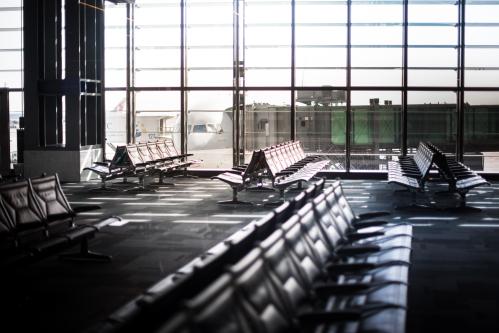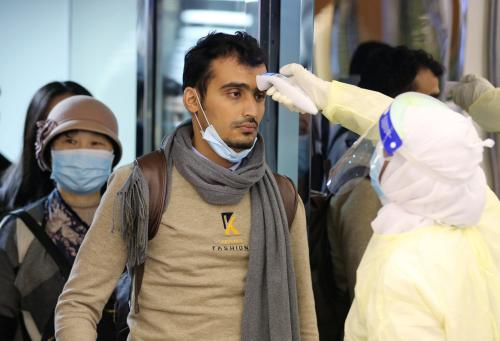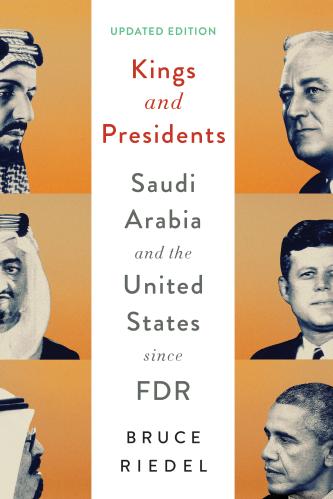Content from the Brookings Doha Center is now archived. In September 2021, after 14 years of impactful partnership, Brookings and the Brookings Doha Center announced that they were ending their affiliation. The Brookings Doha Center is now the Middle East Council on Global Affairs, a separate public policy institution based in Qatar.
SAUDI ARABIA LIMITS HAJJ ATTENDANCE
A Saudi official said June 23 that the hajj pilgrimage, which usually draws up to 2.5 million Muslims from all over the world, would only see at the most a few thousand pilgrims next month due to concerns over the spread of the coronavirus.
The kingdom’s Hajj Minister Muhammad Benten said a “small and very limited” number of people — even as low as just 1,000 from inside the country — would be allowed to perform the pilgrimage to ensure social distancing and crowd control.
GCC ECONOMIES PROJECTED TO SHRINK BY 7.6 PERCENT
Gulf Cooperation Council (GCC) countries will see their economies shrink by 7.6 percent this year, an International Monetary Fund official said on June 30, revising downwards April forecasts of nearly 3 percent.
The six GCC nations are, with varying degrees, facing steep economic declines as the slowdown in business activity due to the pandemic is amplified by a price drop in hydrocarbons, which are their main source of revenue.
GULF STATES CONTINUE TO IMPLEMENT ECONOMIC MEASURES
The Saudi central bank on June 1 said that it had provided 50 billion riyals ($13.3 billion) to support liquidity in the banking sector after consumer spending collapsed in April because of the pandemic.
Kuwait agreed to cut the government entities’ budget for the fiscal year of 2020–21 by at least 20 percent, thecabinet said on Twitter June 2.
Bahrain’s government said on June 29 it would pay 50 percent of salaries for private company workers in hard-hit sectors, state news agency BNA reported.
QATAR, SAUDI ARABIA, AND UAE EASE RESTRICTIONS
Qatar said that it would start lifting coronavirus restrictions under a four-phase plan starting June 15, when some mosques could reopen and flights could depart. The second phase of easing the lockdown would start on July 1, the third on August 1, and the fourth on September 1.
Saudi Arabia said that it would end a nationwide curfew and lift restrictions on businesses from June 21 after three months of lockdown. Restrictions would remain, however, for religious pilgrimages, international travel, and social gatherings of more than 50 people.
The United Arab Emirates (UAE) said that citizens and residents would be allowed to travel to countries deemed low-risk for catching the coronavirus from June 23. The government posted to Twitter on June 24 saying that it had lifted its coronavirus-related curfew.
A government media office in Abu Dhabi said on June 29 that the emirate would allow people to enter if they had tested negative for COVID-19 in the 48 hours before arriving.
OIL PRICES FALL AS GULF TRIO ENDS VOLUNTARY CUTS
Oil fell more than 3 percent on June 8 after OPEC+ nations agreed to extend output cuts, but Saudi Arabia, Kuwait, and the UAE said they would not maintain supplemental reductions that amount to more than a million barrels of daily supply.
Saudi Arabia’s energy minister said on June 8 that the kingdom would boost output in July to match its output OPEC quota while ending voluntary deeper cuts, as it sees the need for more oil at home amid signs of global demand recovery.
YEMEN SEPARATISTS SEIZE SOCOTRA, CEASEFIRE FALLS APART
Southern separatists on June 20 seized control of Yemen’s island of Socotra in the Arabian Sea, deposing its governor and driving out forces of the Saudi-backed government, which condemned the action as a coup.
Days later, both parties agreed on a ceasefire and said they would begin talks in Saudi Arabia to implement a peace deal.
However, security officials said that fierce fighting had continued in southern Yemen on June 25, with battles in the flashpoint Abyan province killing at least 54 fighters on both sides.
UN REMOVES SAUDI-LED COALITION FROM BLACKLIST
U.N. Secretary-General Antonio Guterres on June 15 removed a Saudi Arabia-led military coalition from a United Nations blacklist, several years after it was first named and shamed for killing and injuring children in Yemen.
The coalition killed or injured 222 children in Yemen last year, Guterres wrote in his annual report to the U.N. Security Council. He said the Houthis were responsible for 313 such casualties, the Yemen government forces for 96, and that both remain on the annual children and armed conflict blacklist.
EMIRATI AIRLINES SLASH JOBS, CUT PAY
Emirates’ outgoing President Tim Clark on June 1 said that it could take the state carrier up to four years to resume flying to its entire network that has been decimated by the pandemic. Emirates, one of the world’s biggest long-haul airlines, laid off hundreds of pilots and thousands of cabin crew on June 9 as it manages a cash crunch, and more job cuts are planned, five company sources said. The workforce of 4,300 pilots and nearly 22,000 cabin crew could shrink by almost a third from its pre-coronavirus levels, three of the sources added.
Both the long-haul carrier and Etihad Airways extended the period of reduced pay for their staff until September. Flydubai extended the period indefinitely and placed dozens of pilots on unpaid leave for a year, according to company sources.
The Brookings Institution is committed to quality, independence, and impact.
We are supported by a diverse array of funders. In line with our values and policies, each Brookings publication represents the sole views of its author(s).









Commentary
GCC News Roundup: GCC economies projected to shrink, Qatar, Saudi Arabia and UAE ease restrictions (June 1-30)
July 6, 2020